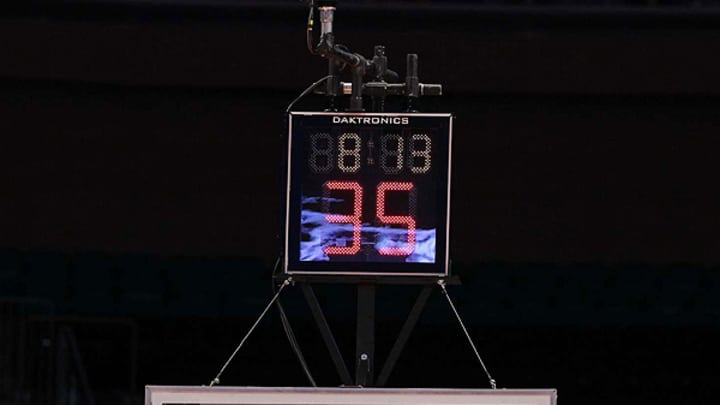Fixing the game: The fallacy of the shorter shot clock

Shortening the shot clock isn't the only way to fix college basketball's scoring decrease. (Porter Binks/SI)
College basketball definitely needs some rule changes. This past season was the lowest scoring in six decades and average tempo across Division I continues to slow. In order to combat that, more and more support is developing for a shortening of the shot clock, to encourage more possessions in a game, which would assumedly raise scoring.
In the last part of this audio clip, Michigan State head coach Tom Izzo is the latest to discuss the shot clock question, noting that Stanford coach Johnny Dawkins said in a recent meeting that men's college basketball is "the slowest game in the world." Technically speaking, that's true, as the NBA, international and even women's college basketball shot clocks are shorter than the current 35-second limit in the men's college game. But shortening the shot clock would be a faulty fix for what currently ails the game, as too many people are conflating "slow" with "overly physical" and "overcoached."
On a base level, no one is forced to use all 35 seconds to take a shot on any possession, and no defense is required to allow an opponent to use the full clock on any given possession. Offenses are looking for their preferred shot and defenses have the right to try to dictate when and how that shot will come. That ongoing battle is part of what makes games with style contrasts interesting. "Slow" basketball teams can run wonderful, entertaining offense. "Fast" teams can look like complete garbage. It's not the tempo of a team that's appealing. It's the fluidity and effectiveness of its play (along with the overall talent level of the players and what kinds of plays they can make).
College basketball can effect more change simply by cracking down on handchecking and chucking cutters in the lane, and start giving the benefit of the doubt on block/charge calls to the offense. Forcing more possessions into the current overly physical box could actually have a worsening effect, especially as more and more coaches continue to eschew offensive rebounding in order to limit transition opportunities for opponents. Teams will continue to end up in more halfcourt sets, but now with fewer seconds to operate, which will definitely lead to more shots (and more turnovers), but almost certainly not better shots or more artful possessions.
In addition to cleaning up contact, there should be a significant cut in the number of timeouts per game. In national TV games, you have eight media timeouts plus all of the full and 30-second timeouts available to each team. There's no way basketball requires upwards of 20 time stoppages in a 40-minute game. That further enables in-game overcoaching, which is curious in an era where complaints about the overall talent levels in the college game (and, especially, the dearth of quality point guards) are rampant. So we want to shorten possessions, overcoach them, and assume hundreds of teams without good lead guards will be able to execute consistently against increasingly sophisticated defenses?
Increased homogeneity is not good for the college game. Whether it's the undercutting of alternate styles of play or the increase in NBA-style isolations that would result from a shorter clock, it would, over time, create a more standard product that's being run by hugely varying levels of talent. Maybe Kentucky could play the new way effectively, but what about Western Kentucky? Additionally, forcing more possessions into a game is likely to reduce upsets, as teams with lesser talent will have to outperform for more trips down the floor. Is a more generic approach with fewer shockers what you want from your regular season, let alone from the first weekend of the NCAA tournament?
Lowering the shot clock to 30 seconds wouldn't destroy college hoops, but it should be considered only after other changes are made. Once the game is cleaned up and flowing better, then you can get a fair sense of whether the "slowness" of the game needs to be changed. While it may benefit the overall development of basketball to have all players playing under more consistent rules, it wouldn't be good for the college game itself. Let the D-League prep players for the pros. Our game doesn't have to be more of a de facto minor league setup than it already is.
